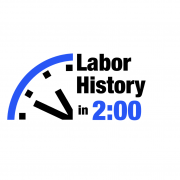On this day in labor history, the year was 1937.
That was the day workers of UAW Local 14 walked out on strike against the Toledo Chevrolet Transmission Plant.
They joined the strike wave against GM.
The national campaign started in November in Atlanta, followed by auto strikes in Kansas City and Cleveland, then intensified in late December with the Great Flint Sit-Down.
Local 14 members had experienced GM’s tricks first-hand during a 1935 strike.
When GM couldn’t stop unionization efforts at the Toledo plant, they began moving the machinery to non-union facilities in nearby Saginaw, Michigan and Muncie, Indiana.
GM’s maneuver drove local 14 leaders to fight for a national agreement and help with organizing the national strike wave.
Once it began, they were able to effectively shut down their plant.
They routinely traveled to Flint during the sit-down, to help with strike support and soup kitchen efforts.
Many local 14 members would also help beat back the police assault on sit-down strikers in the coming Battle of Running Bulls at Flint.
And as Local 14 members walked out on strike at the Chevy plant that day, the UAW presented its eight demands to GM.
These included national collective bargaining rights,
the end to piecework pay systems,
the 30 hour week, 6 hour day,
time and a half for overtime,
a living wage,
reinstatement of discharged workers,
the establishment of seniority rights,
recognition of the UAW as sole bargaining agent,
and shared determination of production speed in all plants.
GM finally started to budge a month later.
This historic agreement would be signed in late March and set the standard in industries across the country as millions of workers sought to unionize.
The Rick Smith Show streams live every weeknight from 9p-11p EST on YouTube & Twitch TV, and the show runs every night in prime time on Free Speech TV starting in January 2022.
Be sure to add the FSTV channel on Apple TV, Amazon Fire TV, Roku, on the FSTV iOS app, or find it in the regular channel lineup on DirecTV or Dish.
Radio listeners – You can find us in most major markets, including New York City on WBAI 99.5 FM, Los Angeles on KPFK 90.7 FM, Chicago on WCPT AM 820, Columbus on 98.3/92.7 FM, Minneapolis on AM950, and many others. Check your local listings.
Questions or comments? Email [email protected]


